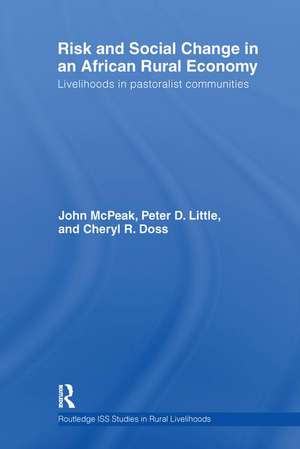Risk and Social Change in an African Rural Economy: Livelihoods in Pastoralist Communities: Routledge ISS Studies in Rural Livelihoods
Autor John G. McPeak, Peter D. Little, Cheryl R. Dossen Limba Engleză Paperback – 9 dec 2016
This study summarizes the findings of a multi-year interdisciplinary research project in pastoral areas of Kenya and Ethiopia. The cultures and ecology of these areas are described, with a particular focus on the myriad risks that confront people living in these drylands, and how these risks are often triggered by highly variable rainfall conditions. The authors examine the markets used by residents of these areas to sell livestock and livestock products and purchase consumer goods before turning to an analysis of evolving livelihood strategies. Furthermore, they focus on how well-being is conditioned upon access to livestock and access to the cash economy, gender patterns within households and the history of development activities in the area. The book concludes with a report on how these activities are assessed by people in the area and what activities they prioritize for the future.
Policy in pastoral areas is often formulated on the basis of assumptions and stereotypes, without adequate empirical foundations. This book provides evidence on livelihood strategies being followed in pastoral areas, and investigates patterns in decision making and well being. It indicates the importance of livestock to the livelihoods of people in these areas, and identifies the critical and widespread importance of access to the cash economy, concluding that future development activities need to be built on the foundation of the livestock economy, instead of seeking to replace it.
| Toate formatele și edițiile | Preț | Express |
|---|---|---|
| Paperback (1) | 465.91 lei 43-57 zile | |
| Taylor & Francis – 9 dec 2016 | 465.91 lei 43-57 zile | |
| Hardback (1) | 1050.98 lei 43-57 zile | |
| Taylor & Francis – 21 iul 2011 | 1050.98 lei 43-57 zile |
Preț: 465.91 lei
Nou
Puncte Express: 699
Preț estimativ în valută:
89.23€ • 91.93$ • 74.75£
89.23€ • 91.93$ • 74.75£
Carte tipărită la comandă
Livrare economică 24 februarie-10 martie
Preluare comenzi: 021 569.72.76
Specificații
ISBN-13: 9781138242449
ISBN-10: 1138242446
Pagini: 224
Ilustrații: 68
Dimensiuni: 156 x 234 x 12 mm
Greutate: 0.45 kg
Ediția:1
Editura: Taylor & Francis
Colecția Routledge
Seria Routledge ISS Studies in Rural Livelihoods
Locul publicării:Oxford, United Kingdom
ISBN-10: 1138242446
Pagini: 224
Ilustrații: 68
Dimensiuni: 156 x 234 x 12 mm
Greutate: 0.45 kg
Ediția:1
Editura: Taylor & Francis
Colecția Routledge
Seria Routledge ISS Studies in Rural Livelihoods
Locul publicării:Oxford, United Kingdom
Public țintă
Postgraduate and UndergraduateCuprins
1. Introduction 2. Culture, History, and Political Ecology 3. Livestock Markes 4. A Risky Region 5. Changing Livelihood Strategies 6. Household and Intra-Household Patterns 7. Development Priorities? 8. Conclusion
Notă biografică
John McPeak is an Associate Professor in the Department of Public Administration in the Maxwell School of Syracuse University, USA.
Peter D. Little is Professor of Anthropology and Director of the Program in Development Studies at Emory University, USA.
Cheryl R. Doss is Senior Lecturer in Global Affairs and Economics and the Director of Graduate Studies for the MA program in International Relations at Yale University, USA.
Peter D. Little is Professor of Anthropology and Director of the Program in Development Studies at Emory University, USA.
Cheryl R. Doss is Senior Lecturer in Global Affairs and Economics and the Director of Graduate Studies for the MA program in International Relations at Yale University, USA.
Descriere
Policy in pastoral areas is often formulated on the basis of assumptions and stereotypes, without adequate empirical foundations. This book provides evidence on livelihood strategies being followed in pastoral areas, and investigates patterns in decision making and well being. It indicates the importance of livestock to the livelihoods of people in these areas, and identifies the critical and widespread importance of access to the cash economy, concluding that future development activities need to be built on the foundation of the livestock economy, instead of seeking to replace it.














